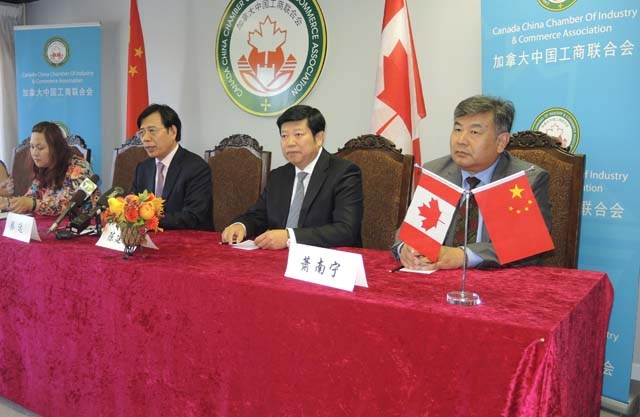It’s getting better, but there are still not enough Chinese-Canadians taking part in the electoral process, according to a Richmond-based business organization.
To accelerate the trend, the Canada China Chamber of Industry & Commerce Association (CCCICA) has set up a task force to encourage more Richmond and Lower Mainland-based Chinese-Canadians to get involved in the federal election in October.
After a press conference at its office on No. 3 and Lansdowne roads last week, the CCCICA’s chairman, David Teng, said more Chinese-Canadians need to step up as candidates and/or vote because the next election is “crucial to Canada’s economic growth and national security.”
“…(It) is also the only way for them to integrate (into) the mainstream of the Canadian communities.”
Although providing no solid statistics to back it up, Teng claimed the low turnout at elections was due to a lack of experience of getting involved in elections in Asia. Also, Chinese-Canadians often regard themselves as “minority ethnics, with less population and, thus, their votes don’t matter much to change the results of the election.”
Because the Conservative government eliminated the long-form Census survey, the most recent profile for Richmond that highlights the proportion of immigrants who become Canadian citizens, was in 2006.
Back then, in Richmond, where “visible minorities” make up the majority of the population, almost one in five immigrants in the city were not eligible to vote in elections because they’re not Canadian citizens.
According to Statistics Canada’s 2006 Census, 17,435 out of 89,880 immigrants aged 18 and older throughout Richmond could not vote because they weren’t Canadian citizens. (Many will be permanent residents, who don’t qualify to vote)
Nevertheless, Teng and the CCCICA feel the Chinese-Canadian voice is still not being heard properly and its “election mobilization team” has a three-point plan to make more of an impact come election time:
Put a call out to Chinese-Canadian citizens living in the Beijing, Shanghai, Guangzhou and Hong Kong regions, showing them how to vote from outside of Canada;
Hold candidates forums; Provide transit on the day of the Oct. 19 election by organizing a fleet of volunteer drivers for Chinese-Canadian voters. Cheng told the News those tactics may help his community, which, he claims, has several bones of contention with the way the country is being run.
“As far as the Conservative Party is concerned, they were not supposed to amend immigrant policy without communication with Chinese Canadians.
“As for the (Liberal Party), they haven’t heard the voices of Chinese Canadians on the issues of legalization of marijuana and so on.
“As for NDP, they should address if their economic policy is reasonable and feasible, since Chinese Canadians are more concerned about economic growth than other aspects.”



